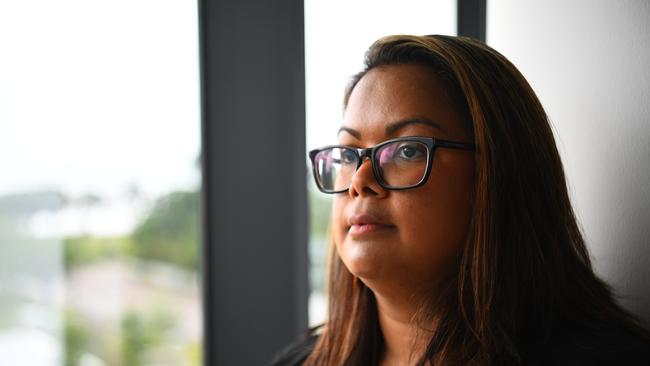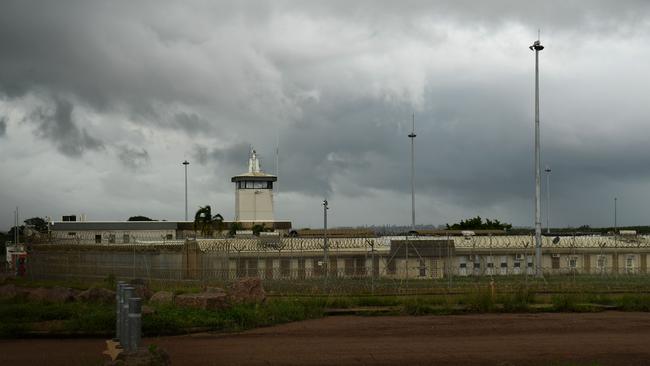Recidivism rates to be included in bail law review
Recidivism rates will be used by the NT government to assess success of toughened youth bail laws.
News
Don't miss out on the headlines from News. Followed categories will be added to My News.
UPDATE: RECIDIVISM rates will be used by the NT government to assess the success of toughened youth bail laws.
Police Minister Nicole Manison confirmed recidivism among children in detention would be a key metric in review of youth justice changes introduced in May 2021.
“You generally look at the offending rates and so forth with what you’ve been dealing with there and some of the outcomes for those kids,” Ms Manison said. She said a priority of the Youth Justice system was setting children up and keeping them out of the criminal justice system.
“We have strengthened those youth justice laws; we are making sure we’re also working with those young people as early as we can to try to get them on a better path,” she said.
The renewed bail laws have doubled the number of children in juvenile detention, and included a steep rise in kids younger than 14.
The Office the Children’s Commissioner reported 82 children were remanded or detained in June 2021 compared with 40 in June 2020.
Acting Children’s Commissioner Nicole Hucks said at the time it raised concerns the reforms would “lead to more young people exposed to the criminal justice system”.
“(There are) more individual children going into detention following the May 20, 2021, bail amendments,” Ms Hucks said.
She said recidivism rates among children in detention were about 70 per cent, while the NT government said diversion recidivism rates were only 30 per cent.
“What I’m concerned about is the lack of availability of diversion, and the time it takes to refer a young person to diversion,” Ms Hucks said.
Data released from the Productivity Commission showed in 2019 recidivism within 12 months was up by 5 per cent year-on-year to 67.7 per cent, but the OCC believes that would now be higher.
Ms Huck said the delays meant at-risk kids were not receiving support, which meant they were more likely to reoffend and therefore lose diversion eligibility and end up in facilities such as Don Dale.
According to data released by the Productivity Commission, the Northern Territory has one of the lowest rates of youth diversion of any jurisdiction in Australia.
Diversion programs have dropped to 33.4 per cent down from 41.1 in 2019-20. The drop in diversion rates is now on par with statistics prior to the royal commission.
Ms Hucks said the bail laws versus youth diversion programs were radically different approaches.
“Diversion is to deter young people from going into a custodial setting, whereas detention facility in itself is the end result,” she said.
“Young people in detention have been subjected to trauma in their lives, by putting them in a detention facility you are retraumatising them.”
A NT government spokesman said 70 per cent of young offenders in a diversion program did not reoffend in the next six months, with 64 per cent “staying out of trouble” a year later.
A condition in approving the toughened sanctions was the promise of a review after 18 months, however it is not clear how the review will work.
EARLIER: Harm to Territory kids has significantly increased according to the Office of the Children’s Commission (OCC).
According to the OCC Annual Plan in 2020/21 there was a significant increase in the number of children who experienced multiple events of harm or abuse over the year and nearly half of these children were aged between 0-4 years old.
The review:
In a review of case notes for 35 children the OCC found 72 substantiated claims of harm.
“The immediate and long term impacts of harm, particularly cumulative harm, on Territory children is of significant concern to the OCC,” said Acting Children’s Commissioner Nicole Hucks.
“Cumulative harm refers to the effect of multiple episodes of abuse or neglect experienced by a child over a prolonged period of time.”
Ms Hucks said the earlier children experience cumulative harm, the more significant the life-long impacts are on their healthy development.
“These experiences can impede children’s physical, cognitive, emotional, and social growth, including increased risk of developing challenging behaviours often linked to youth offending such as difficulty in regulating emotions.”

The relationship between harm and juvenille detention:
Ms Hucks said work undertaken by the OCC last year into the children aged under 14 years in youth detention highlighted these long-term impacts.
She said all of the children had experienced significant and detrimental cumulative harm from when they were very young, and there was a “lack of support provided to the children and their families to address these concerns.”
During the monitoring period in 2021, the majority of issues raised from young people in detention related to their ‘treatment’, in particular the relationships between staff and young people.
According to the report treatment relates to physical restraint, use of force, separation, at risk procedures, searches, behaviour management system, (access to) therapeutic programs and interventions, leaving detention planning and education.

The government’s response:
The NT News is awaiting data from the Department of Territory Families Housing and Community regarding the rate of harm recorded for children in care – including those in Don Dale.
According to department spokeswomen there was no centralised data used to track rates of harm. She said the system did not record the data about a child’s harm to themselves as “mandatory field” and therefore data regarding rates of attempted suicide could not be “extracted for reporting purposes.”
Despite two children in the care of NT Government dying by suicide between 2017-2021.
In both the OCC annual report and OCC monitoring reports concerns about the NT Government’s transparency in reporting were raised.
These figures come after the NT Government said they have implemented all recommendations from the Royal Commission into Protection and Detention of Children in the NT and boasted a new Aboriginal Justice Agreement in 2021.
A NT Government spokesman said $229 million is being invested across five years for the implementation of the Royal Commission findings, along with other reforms to better support vulnerable children, young people and families.
“Northern Territory children bear the consequences of a fragmented service system that does not adequately meet their unique support needs,” Ms Hucks said.
EARLIER: THE Territory’s Acting Children Commissioner has firmly condemned the use of Berrimah Prison as a juvenile detention centre.
Just weeks into the job, Acting Children’s Commissioner and Larrakia woman Nicole Hucks said the facility was not an adequate place to keep children.
“No (it isn’t). It is a prison that was established to house adults," she said.
“Adults and children have very different needs developmentally, cognitively and neurologically.
“The biggest step for me and going forward is getting a truly therapeutic approach to young people.”
In 2021 the Office of the Children’s Commission (OCC) completed a monitoring report which detailed the conditions inside Don Dale Youth Detention Centre.
The report showed 27 young people were detained in February 2021, however according to Territory Families, Housing and Communities (TFHC) on Friday 48 young people were in the facility — an almost 100 per cent increase.
According to the monitoring report released in October 2021, interviews with staff revealed mixed cultural attitudes towards a therapeutic model of care.
“One staff member was able to passionately articulate a therapeutic model of care and how it can be implemented into the daily care of young people,” the report said.
“Where another staff member interviewed felt that therapeutic interventions for children were putting staff ‘at risk’ and felt that the use of more restrictive and punitive measures of control was required.”
According to a TFHC spokeswoman, all staff undertake a six-week induction and ongoing training course. Of the 25 modules listed in the program three referenced working with people who have experienced trauma.
The OCC highlighted that youth, “particularly in H block, were living in a cage-like setting with minimal trauma informed responses from Youth Justice Officers”.
Furthermore the report showed extensive staff shortages were resulting in children being held in their cells for 23 hours and 45 minutes per day.
It also showed some children who were “at risk” of self-harm did not receive medical attention for up to three days.
The TFHC spokeswoman said all young people received services that were appropriate to them and were provided in a culturally safe manner.
But Ms Hucks fundamentally disagreed.
“I‘m going to name it. The majority of kids in detention are Aboriginal kids,” she said.
“We have 97 to 100 per cent of Aboriginal kids in those facilities on any given day.
“My concern is that those young people are coming into a facility where their culture, their traditions, their histories, their family connection is almost severed at the door.”
According to the OCC Annual Plan, separations, which place a young person in isolation, were used 131 times.
Despite separations being reportable to the OCC, when the NT News asked TFHC for the total number of separations in 2020 and 2021, they could not provide an answer by deadline.
When reviewing use of force incident reports the OCC found that in at least three instances force was used to secure young people in their cell for the purpose of separation however there was no formal separation recorded.
According to Ms Hucks this raised concern that young people could be confined to their room without the formal recording of separation.
The government said it had implemented all recommendations from the 2016 Royal Commission into the Protection and Detention of Children in the NT that it was responsible for in the years since they were made.
“There were 227 recommendations in total and the NT Government committed to delivering on 218 recommendations that it is responsible for,” a TFHC spokeswoman said.
“The remaining recommendations are the responsibility of the Australian Government and the NT Land Councils.”
According to the OCC complaints about youth in detention is currently 70 per cent of their overall workload.
Originally published as Recidivism rates to be included in bail law review




